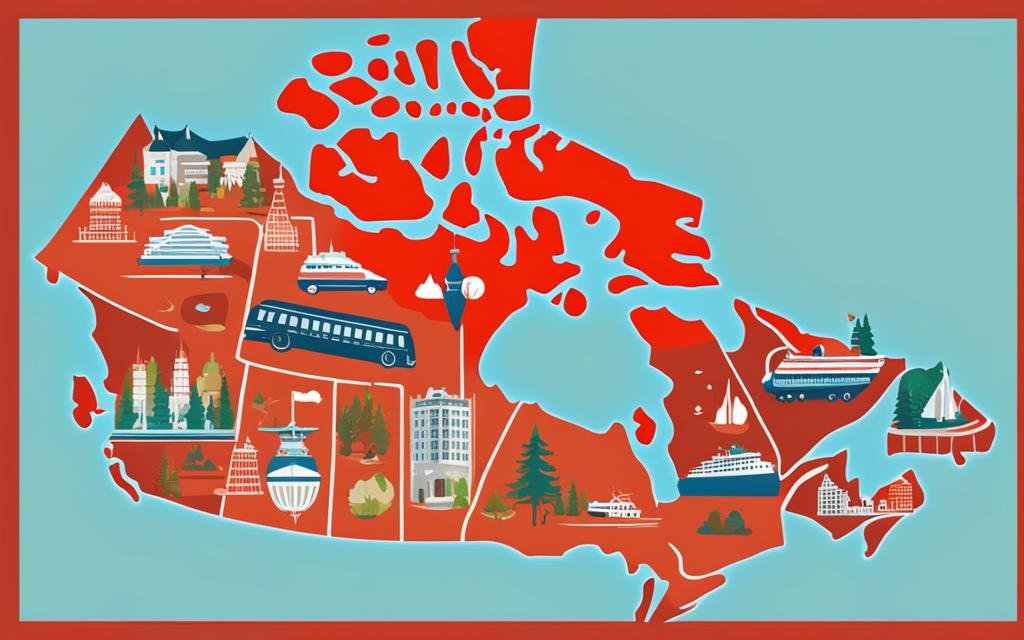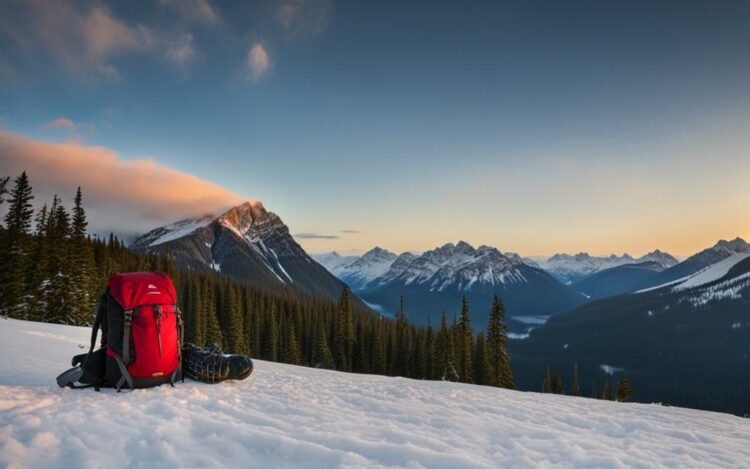Planning a trip to Canada? It’s essential to understand the cost breakdown and budget accordingly. Whether you’re exploring the vibrant city of Toronto or immersing yourself in the stunning landscapes of Banff National Park, knowing the average expenses for a 10-day trip will help you plan your finances and make the most of your adventure.
When it comes to travel expenses in Canada, factors such as meals, local transportation, and accommodation play a significant role. By understanding the average costs and considering budget-friendly options, you can enjoy all that Canada has to offer without breaking the bank.
Key Takeaways
- The average cost of a 10-day trip to Canada is around $175 per day.
- Travel expenses in Canada include meals, local transportation, and accommodation.
- Canada is considered a moderately priced destination compared to other countries in North America.
- To travel on a budget in Canada, consider options like staying in budget hotels, cooking your own meals, and utilizing public transportation.
- Top tourist attractions in Canada include whale watching, exploring Banff National Park, and visiting Halifax in Nova Scotia.
Travel Expenses in Canada
When planning your budget for a trip to Canada, it’s important to have a clear understanding of the travel expenses involved. Knowing how much you can expect to spend on meals, local transportation, and hotels will help you plan your finances accordingly. Here is a breakdown of the average daily travel expenses in Canada based on the experiences of past travelers:
- Meals: On average, you can expect to spend around $39 per day on meals during your trip. This amount can vary depending on your dining preferences and the type of establishments you choose to eat at.
- Local Transportation: Budgeting for local transportation is important to ensure smooth and convenient travel within Canada. On average, you can anticipate spending approximately $22 per day on transportation options such as buses, trains, or taxis.
- Hotels: Accommodation expenses can vary greatly depending on your preferred level of comfort and the location you choose to stay in. For an average hotel in Canada, you can expect to spend around $190 per day.
In addition to these core expenses, it’s essential to consider other miscellaneous costs. These include entertainment, tips, and alcohol, which can significantly impact your overall travel budget.
When estimating your travel expenses, keep in mind that these figures are averages based on past traveler experiences. Your actual expenses may vary depending on factors such as your travel style, preferences, and the specific region of Canada you plan to visit.

Planning for Your Budget Trip
If you want to make the most of your budget for a trip to Canada, consider these tips:
- Research budget-friendly accommodations such as budget hotels or hostels to reduce your hotel expenses.
- Save on food costs by cooking your own meals whenever possible or opting for affordable dining options.
- Take advantage of public transportation, which is often more cost-effective than renting a car or taking taxis.
- Consider camping in national parks, as it provides an affordable alternative to traditional accommodation.
- Plan your trip during the off-season to take advantage of lower prices and fewer crowds.
- Focus on exploring Canada’s natural beauty, which often comes at no cost or minimal expense.
By following these tips and being mindful of your expenses, you can enjoy a memorable trip to Canada without overspending.
Is Canada Expensive to Visit?
When planning a trip to Canada, one of the key considerations is the cost. Many travelers want to know whether Canada is an expensive destination or if it offers affordable travel options. The good news is that Canada is considered a moderately priced destination, with costs that are comparable to other countries in North America.
Food, accommodation, and transportation in Canada are reasonably priced, making it an affordable destination for travelers. Whether you’re dining out or buying groceries to cook your own meals, you’ll find a range of options to fit different budgets. Accommodation choices include everything from luxury hotels to budget-friendly hostels, giving you flexibility in finding a place to stay that suits your preferences and financial situation.
Transportation costs in Canada are also reasonable. The country has a well-developed network of public transportation, including buses and trains, which makes it convenient to get around. If you’re planning to rent a car, you’ll find that gas prices in Canada are relatively lower compared to other countries.
It’s important to note that the overall cost of travel in Canada can vary depending on the specific region you visit and the time of year. Major cities like Toronto and Vancouver tend to have higher prices, while smaller towns and rural areas may offer more affordable options. Additionally, travel costs can fluctuate depending on the season, with peak tourist times usually more expensive.
To give you a better idea of the cost breakdown, here’s a breakdown of average daily expenses:
- Meals: $39 (including dining out and groceries)
- Local transportation: $22 (public transportation or gas)
- Hotels: $190 (range of options available)
Considering that Canada offers a diverse range of attractions, stunning natural landscapes, and vibrant cities to explore, it remains a popular choice for travelers seeking memorable experiences without breaking the bank.
Tips for Budget Travel in Canada
When planning a trip to Canada, it’s important to consider budget-friendly options to make your travel experience more affordable. Here are some tips to help you save money while exploring this beautiful country:
- Stay in budget hotels or hostels: Instead of splurging on luxury accommodations, consider staying in budget-friendly hotels or hostels. This can significantly reduce your accommodation expenses, leaving more money for other activities.
- Cook your own meals: Eating out can quickly add up, especially in popular tourist areas. To save money on food, consider cooking your own meals. Many budget hotels and hostels offer communal kitchens where you can prepare simple, cost-effective meals.
- Take advantage of public transportation: Instead of relying on taxis or rental cars, utilize public transportation options such as buses and trains. This can be a more affordable way to get around and explore different cities and regions in Canada.
- Consider camping in national parks: Canada is renowned for its stunning national parks. Instead of staying in hotels, opt for camping in these parks. Not only is it a cost-effective option, but it also allows you to fully immerse yourself in nature.
- Visit during the off-season: Traveling during peak tourist seasons can be more expensive due to increased demand. If possible, plan your trip to Canada during the off-season when prices for accommodations and attractions are lower.
- Focus on exploring natural beauty: Canada is blessed with breathtaking natural landscapes. By prioritizing outdoor activities such as hiking, biking, and wildlife spotting, you can enjoy budget-friendly entertainment options while experiencing the country’s stunning scenery.
By incorporating these tips into your travel plans, you can enjoy a memorable and budget-friendly trip to Canada. Saving money in Canada doesn’t mean compromising on quality experiences; it means finding affordable alternatives and making the most of what the country has to offer.

Top Tourist Attractions in Canada
When visiting Canada, you’ll find a plethora of top tourist attractions that showcase the country’s natural beauty and cultural diversity. From stunning coastlines to majestic mountains, Canada offers something for everyone. Here are some must-visit places and things to do in Canada:
- Whale Watching on the Atlantic or Pacific Coast: Experience the thrill of witnessing these magnificent creatures up close. Embark on a whale-watching tour along the Atlantic coast in provinces like Newfoundland and Labrador, or head to the Pacific coast in British Columbia, known for its abundance of marine life.
- Exploring Banff in the Canadian Rockies: Immerse yourself in the breathtaking beauty of Banff National Park, located in the heart of the Canadian Rockies. Hike through picturesque trails, soak in hot springs, and marvel at turquoise lakes surrounded by towering snow-capped peaks.
- Visiting Halifax in Nova Scotia: Discover the vibrant city of Halifax, known for its rich maritime history and lively culture. Explore the historic waterfront, visit the fascinating Maritime Museum of the Atlantic, and indulge in delicious seafood at the local restaurants.
Canada is also famous for its regional specialties and international cuisine. Don’t miss the opportunity to try some of the country’s iconic dishes, such as poutine, a delectable combination of fries, cheese curds, and gravy, or Nanaimo bars, a sweet treat originating from the city of Nanaimo in British Columbia. For a taste of French Canadian cuisine, be sure to sample croquignoles, a traditional pastry often enjoyed during the holiday season.
Immerse yourself in the beauty, history, and culinary delights of Canada’s top tourist attractions. With its diverse landscapes and cultural experiences, Canada offers endless opportunities for memorable adventures.
Conclusion
After analyzing the cost breakdown and expenses associated with a 10-day trip to Canada, it is clear that careful planning and budgeting are key to making the most of your journey. By considering travel expenses, opting for budget-friendly options, and exploring the top tourist attractions, you can have a wonderful experience without straining your finances.
Understanding the average daily expenses, such as meals, local transportation, and hotel accommodations, allows you to estimate the overall cost of your trip. It’s important to note that these costs may vary depending on the region and time of year, so conducting thorough research beforehand is essential.
When it comes to budget travel in Canada, there are various options to help you save money. Staying in budget hotels or hostels, cooking your own meals, and utilizing public transportation are effective ways to cut down on expenses. Additionally, visiting during the off-season and focusing on natural attractions can significantly reduce entertainment costs.
In conclusion, by following these tips and being mindful of your budget, you can have a memorable and cost-effective trip to Canada. From stunning landscapes to delicious cuisine, this beautiful country offers a wealth of experiences for every traveler. So, plan ahead, explore the diverse attractions, and enjoy all that Canada has to offer without breaking the bank.
FAQ
What is the average cost of a 10-day trip to Canada?
The average cost of a 10-day trip to Canada is around $175 per day.
What does the average daily travel expenses in Canada include?
The average daily travel expenses in Canada include meals, local transportation, and hotels.
How much does food typically cost in Canada?
The average cost of meals in Canada is around $39 per day.
How much does local transportation cost in Canada?
The average daily cost of local transportation in Canada is around $22.
How much can I expect to spend on hotels in Canada?
The average cost of hotels in Canada is approximately $190 per day.
Is Canada an expensive destination to visit?
Canada is considered a moderately priced destination, with costs comparable to other countries in North America.
How can I travel on a budget in Canada?
To travel on a budget in Canada, consider staying in budget hotels or hostels, cooking your own meals, and taking advantage of public transportation.
What are some top tourist attractions in Canada?
Popular tourist attractions in Canada include whale watching, exploring Banff in the Canadian Rockies, and visiting Halifax in Nova Scotia.

